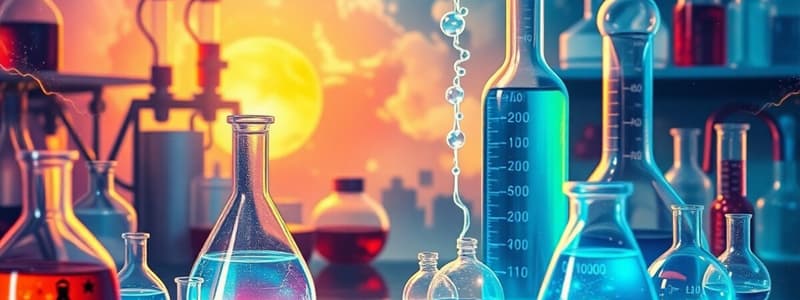Podcast
Questions and Answers
What does a procedure in quantitative analysis primarily consist of?
What does a procedure in quantitative analysis primarily consist of?
- A set of theoretical discussions
- A list of potential errors
- A set of written directions for applying a method (correct)
- A comprehensive review of the literature
What is meant by a 'specific' technique in analytical procedures?
What is meant by a 'specific' technique in analytical procedures?
- A technique that can be used for multiple analytes
- A technique that simplifies complex samples
- A technique that is widely recognized
- A technique that applies to a single analyte (correct)
What role do interferences play in quantitative analysis?
What role do interferences play in quantitative analysis?
- They enhance the accuracy of results
- They may cause errors by affecting the measured quantity (correct)
- They are necessary for sample preparation
- They are irrelevant to the measurement process
Why is sampling crucial in quantitative analysis?
Why is sampling crucial in quantitative analysis?
What is the purpose of calibration in a quantitative analysis?
What is the purpose of calibration in a quantitative analysis?
Which method is important for evaluating results in quantitative analysis?
Which method is important for evaluating results in quantitative analysis?
How are replicate samples defined in quantitative analysis?
How are replicate samples defined in quantitative analysis?
What is the expected outcome of eliminating interferences during analysis?
What is the expected outcome of eliminating interferences during analysis?
What does the term 'matrix' refer to in quantitative analysis?
What does the term 'matrix' refer to in quantitative analysis?
What are the challenges associated with preparing biological samples?
What are the challenges associated with preparing biological samples?
What is the total mark allocation for the final exam of the course?
What is the total mark allocation for the final exam of the course?
How many lectures are dedicated to the topic of 'Errors in Chemical Analysis'?
How many lectures are dedicated to the topic of 'Errors in Chemical Analysis'?
Which chapter discusses the 'Statistical Data Treatment and Evaluation' topic?
Which chapter discusses the 'Statistical Data Treatment and Evaluation' topic?
What is covered in Chapter 10 of the course outline?
What is covered in Chapter 10 of the course outline?
How many lectures cover 'Gravimetric Methods of Analysis'?
How many lectures cover 'Gravimetric Methods of Analysis'?
Which methods are discussed in Chapter 13?
Which methods are discussed in Chapter 13?
What topic is NOT included in the course outline?
What topic is NOT included in the course outline?
Which chapter includes the topic of 'Complexation Reactions and Titrations'?
Which chapter includes the topic of 'Complexation Reactions and Titrations'?
How many lectures are allocated to the topic 'Aqueous Solutions and Chemical Equilibria'?
How many lectures are allocated to the topic 'Aqueous Solutions and Chemical Equilibria'?
What does Chapter 6 focus on in the course outline?
What does Chapter 6 focus on in the course outline?
What is the primary focus of analytical chemistry?
What is the primary focus of analytical chemistry?
What does qualitative analysis determine?
What does qualitative analysis determine?
Which area of analytical chemistry deals with the amount of substance present?
Which area of analytical chemistry deals with the amount of substance present?
Which of the following best describes chemometrics?
Which of the following best describes chemometrics?
Which field is NOT a typical application of analytical chemistry?
Which field is NOT a typical application of analytical chemistry?
What is a focus area within analytical chemistry that involves the development of new measurement tools?
What is a focus area within analytical chemistry that involves the development of new measurement tools?
In what aspect does analytical chemistry differ from physical chemistry?
In what aspect does analytical chemistry differ from physical chemistry?
Which type of analysis evaluates a sample's chemical or physical properties?
Which type of analysis evaluates a sample's chemical or physical properties?
What constitutes analytical chemistry's contribution to the field of forensics?
What constitutes analytical chemistry's contribution to the field of forensics?
What is a key characteristic of analytical chemistry in terms of materials?
What is a key characteristic of analytical chemistry in terms of materials?
What does quantitative analysis determine?
What does quantitative analysis determine?
What is the purpose of qualitative analysis?
What is the purpose of qualitative analysis?
Which method uses an apparatus to measure physical quantities?
Which method uses an apparatus to measure physical quantities?
Which of the following is categorized as a classical method?
Which of the following is categorized as a classical method?
What term describes the component of interest in a sample?
What term describes the component of interest in a sample?
Which component is referred to as the major constituent in a sample?
Which component is referred to as the major constituent in a sample?
What is considered the matrix of a sample?
What is considered the matrix of a sample?
What type of analysis focuses on improving an analytical method's capabilities?
What type of analysis focuses on improving an analytical method's capabilities?
Which analytical technique involves measuring light absorption?
Which analytical technique involves measuring light absorption?
What method is primarily used for quantitative analysis?
What method is primarily used for quantitative analysis?
Flashcards are hidden until you start studying
Study Notes
Analytical Chemistry
- Analytical chemistry is the study of the separation, identification, and quantification of the chemical components of natural and artificial materials.
- Analytical chemistry is focused on improvements in experimental design, chemometrics, and the creation of new measurement tools.
- The main goal of analytical chemistry is to provide better chemical information.
Types of Chemical Analysis
- Qualitative analysis determines the identity of the constituent species in a sample.
- Quantitative analysis determines how much of a constituent species is present in a sample.
- Fundamental analysis improves an analytical method's capabilities.
Types of Analytical Methods
-
Classical Methods:
- Also known as “wet chemistry methods”
- Use only chemicals for separations such as precipitation, extraction, and qualitative analysis by color, odor, or melting point.
-
Instrumental Methods:
-
Use an apparatus to measure physical quantities of the analyte such as light absorption, fluorescence, or conductivity.
-
Examples:
- Spectroscopy
- Electrochemistry
- Chromatography
-
Terms in Analytical Chemistry
- Procedure: A set of written directions detailing how to apply a method to a particular sample.
- Analyte: The component of interest in a sample.
- Matrix: All of the components in the sample containing an analyte.
- Interference: Species that causes an error in an analysis by enhancing or attenuating the quantity being measured.
- Constituent: A component of a sample.
- Major constituent: % 1-100
- Minor constituent: % 0.01-1
- Trace constituent: ˂ %0.01
- Technique: A chemical or physical principle that can be used to analyze a sample.
- Method: The application of a technique for the determination of a specific analyte in a specific matrix.
Key Steps in a Typical Quantitative Analysis:
- Select a method: Accuracy, reliability, time and cost, complexity of sample are important factors.
- Sampling: Obtaining a representative sample is crucial, especially for mass products.
- Sample preparation and handling: This involves dissolving and preparing samples to ensure homogeneity.
- Define Replicate sample: Multiple samples are analyzed to determine accuracy, reliability, and cost.
- Eliminating interferences: Blanks and control samples are used to minimize the effect of species other than the analyte.
- Calibration and measurement: Establish the relationship between the measured property and the property of interest.
- Calculation and data reduction: Convert the measured data to the desired unit.
- Evaluating results and estimating reliability: Use statistics to assess the reliability of the results.
Studying That Suits You
Use AI to generate personalized quizzes and flashcards to suit your learning preferences.





